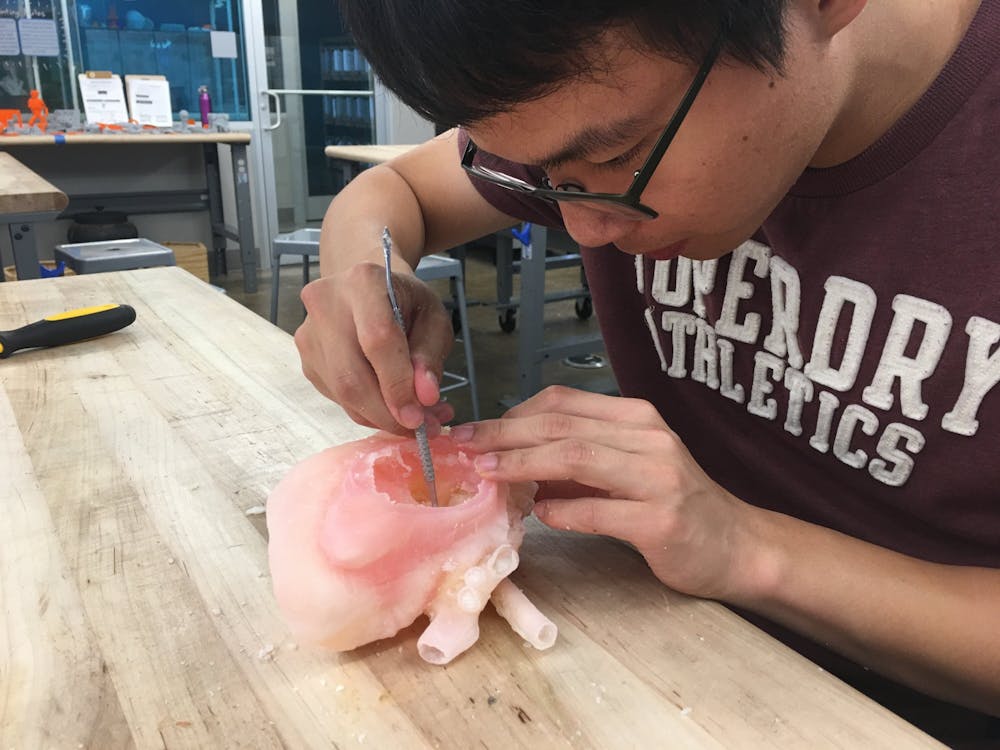I walked into the Rubenstein Arts Center just after 2:00 pm on Monday, Oct. 5 and was immediately lost. I meandered through the Ruby, feeling self-conscious of the fact that I was already late and walking in circles, trying to open locked doors, obviously with no idea where I was going. I must have walked past my destination two or three times before finally knocking on the door to the Innovation Co-Lab Studio. Thankfully, I had made it to the right place — just in time to start the soap-making workshop.
As I mixed Crisco, olive oil, fragrances, colored powder and lye, I was struck by the absurdity of what I was doing. It was a weekday afternoon, yet instead of holing up in my dorm room to finish an endless workload, I was learning the art of making soap. Still, I couldn’t deny the therapeutic nature of the workshop.
I returned to the studio a week later to pick up my finished product — a loaf of purple, honey-and-vanilla scented soap. The workshop was truly one of the more unique experiences I have had at Duke so far.
As it turns out, it isn’t unique at all.
The soap-making workshop offered by the Innovation Co-Lab is one of 110 offered this semester. A self-proclaimed “creativity incubator,” the Innovation Co-Lab is a branch of the Duke Office of Information and Technology (OIT), representing an intersection between art and technology.
“Even though we’re a technology unit, there’s a humanities element,” said Chip Bobbert, Senior Technology Architect and one of my soap-making instructors.
Bobbert has worked at the studios since their inception seven years ago, back when the lab was called “Innovation Studios.” He and my other instructor, Sandra Bermond, emphasize the increasing coexistence of art and technology embedded within Co-Lab workshops.
“Technology is not really an end goal; it’s more of a tool… You can kind of make whatever you want with it,” Bermond said.
The class I took undoubtedly had STEM elements mixed in, including a 20 minute introductory lecture on the chemical reactions between ingredients that eventually form soap and using an immersion blender’s power-tool cousin to mix said ingredients. The finished products were akin to rudimentary sculptures. And just like that artwork, the technology beyond it goes unnoticed.
Bermond is the Program Manager for Roots, a program of workshops under the Innovation Co-Lab brand. This soap-making workshop is the program’s most popular, with a fifty-person waiting list. COVID safety regulations restricted our class to six people, rather than the standard fourteen. Amazingly, this is the second time this semester that the workshop has been offered. Bobbert and Bermond plan to offer it a third time this fall, and a number of times in the spring, if they can. Bermond hopes to utilize the popularity of this workshop to foster excitement for the others.
“[This] is one of those classes that we feel like could be a nice carrot… We could maybe tell them, ‘Hey, if you want to take this class, first you have to take this modeling class… and print your mold so that you can pour your soap into your mold,’” she said.
All three Innovation Co-Lab locations — the Co-Lab Studio in the Telecom Building, Ruby Makerspace and Lilly Library — are equipped with 3D printers. Regardless, while technological in nature, Roots workshops allow students’ creativity to shine.
“We’re starting to branch out… into the creative side of 3D design,” Bobbert said. “I’d like to add Digital Sculpting and Character Modeling and things like that.”
Bermond usually instructs design-based courses that show students how to use digital tools for more artistic projects; her favorite tool to teach is the laser cutter. She also recommended a class on sewable circuits, which teaches students how to make light-up clothing.
In addition to classes, the Innovation Co-Lab has staffed hours during which students can visit their well-equipped studios
Payton Schubel, T ‘23, started working with Co-Lab this semester.
“I work about 10 [hours]; that’s probably on the high end… The main responsibility is customer-facing interaction,” she said. “My job is to show you how to use the machines… On top of that, I also help maintain the 3D printers and clean up.”
Bobbert and Bermond are eager to cater to more students. “We sort of have this weird role: we’re not faculty, and we’re not staff. We’re in this co-curricular state, trying to provide these experiential learning opportunities for students,” Bobbert said.
The mission of Innovation Co-Lab is to teach students how to use the technology available to them. But the soap-making class and various design classes prove that art and technology can be integrated. As the Co-Lab evolves, that connection only grows stronger.
Get The Chronicle straight to your inbox
Sign up for our weekly newsletter. Cancel at any time.

